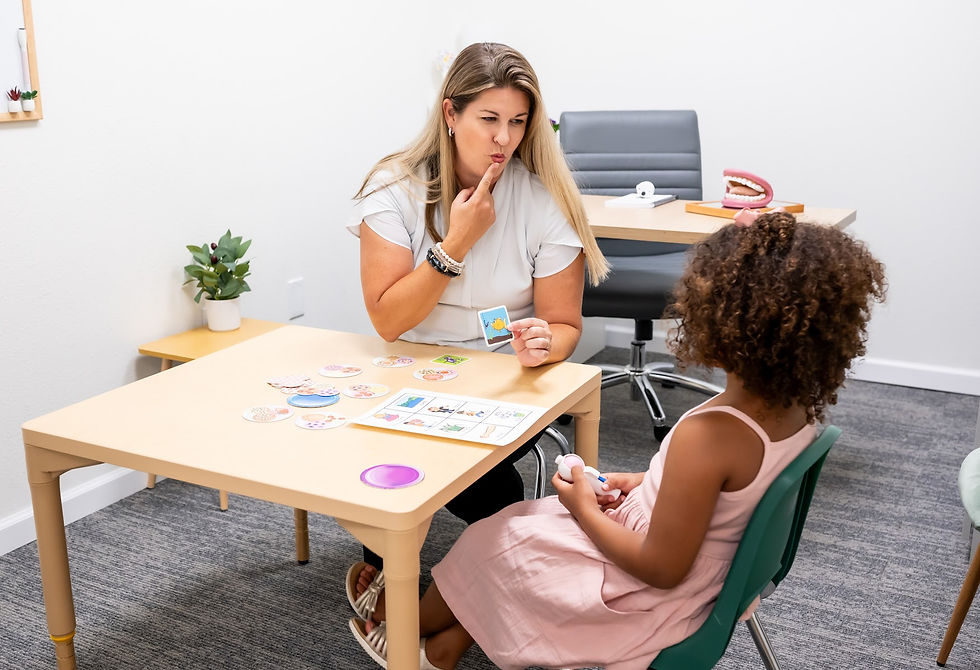The Role of Speech Language Pathologists in Literacy Development
- Cara Bridge

- Jun 30, 2025
- 3 min read
Updated: Jul 7, 2025
The Benefits of Seeking an SLP to Enhance your Child's Literacy Skills

What makes an SLP unique in treating reading and writing disorders?
Speech Language Pathologists are trained in language and its subsystems - phonology, morphology, syntax, semantics, and pragmatics. This knowledge is extremely valuable when identifying, diagnosing, and treating disorders of literacy.
Phonology refers to the system of sounds in a language and how those sounds are organized. Phonological awareness, the ability to recognize and manipulate sounds, is a critical aspect of literacy. Unique training and knowledge of phonology allows SLPs to help children connect what they hear to what they see in print. Strong phonological skills lay the groundwork for decoding, word recognition, and reading comprehension.
Similarly, morphology and syntax are fundamental components of language that play a critical role in reading development.
Morphology refers to the study of morphemes—the smallest units of meaning in language—which include root words, prefixes, and suffixes. Morphological awareness enables readers to break unfamiliar words into meaningful parts, supporting both decoding and vocabulary growth. For example, a child who understands the word “happy” and the prefix “un-” can decode and comprehend the meaning of “unhappy.” Likewise, familiarity with the base word “jump” can help a child understand related forms such as “jumped” and “jumping.”
Syntax involves the rules for arranging words and phrases to form meaningful sentences. It plays a vital role in sentence comprehension and reading fluency, as well as in the development of writing skills, including grammar and punctuation.
Together, morphology and syntax provide the structural framework that allows children to decode, interpret, and construct increasingly complex words and sentences—skills essential for proficient reading and academic success.
As children transition from learning to read to reading to learn, semantic skills become increasingly important. Semantics involves understanding the meaning of words and sentences, which directly supports vocabulary development, the use of context clues, and higher-level comprehension and inferencing abilities. Reading extends beyond the ability to decode words; strong semantic skills enable children to interpret word meanings, comprehend sentences and passages, and construct knowledge that supports academic achievement.
The final subsystem of language is pragmatics, which refers to the social use of language. While it may not seem directly related to literacy at first glance, pragmatic skills play an important role in reading and writing development. These skills enable students to use language appropriately in context, which supports effective written expression. Pragmatic competence also aids in the interpretation of characters’ intentions, emotions, and relationships—skills that are essential for understanding narratives. Furthermore, storytelling relies heavily on pragmatic abilities such as sequencing ideas, adopting others’ perspectives, and recognizing social relationships between characters. Students with pragmatic language difficulties may struggle to interpret characters’ thoughts and actions, understand figurative or nonliteral language, and organize their ideas clearly in writing. In this way, pragmatic skills serve as a crucial bridge between basic decoding and the effective, meaningful use of language.
Speech-language pathologists bring a unique and essential perspective to literacy development through their deep understanding of the five subsystems of language: phonology, morphology, syntax, semantics, and pragmatics. Each of these domains plays a distinct yet interconnected role in supporting the skills required for reading and writing success. From foundational sound awareness and word structure to sentence formation, vocabulary meaning, and social language use, SLPs are equipped to identify and address the wide range of language-based challenges that can impact literacy. By targeting these underlying language skills, speech-language pathologists not only help children become stronger readers and writers but also more confident and effective communicators. Their expertise is critical in ensuring that students develop the language foundations necessary for lifelong learning and academic achievement.
If you have concerns about your child's language or literacy development and are in the Tampa Bay Area, contact us to meet with a Speech Language Pathologist at Bridge Speech Therapy.






Comments